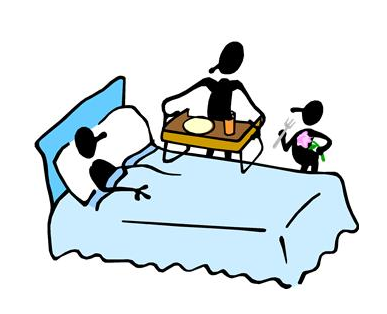TO CHEW ON: "You shall not go about as a talebearer among your people." Leviticus 19:16
In the middle of Leviticus (a book we tend to ignore because we think it's mostly a set of dry instructions for Old Testament Israelites), comes a down-to-earth chapter on practical holiness. In it are several guidelines about the use the tongue: against lying (Leviticus 19:11); against using God's name in oaths and profanity (Leviticus 19:12); against cursing the deaf (Leviticus 19:14); against being partial in judgment (Leviticus 19:15) and then something we might consider almost too trivial to include in this list of grave sins—against being a talebearer (Leviticus 19:16). What is this, and could God's ban on this activity for the Israelites be relevant for us today?
What is talebearing?
[Talebearer = rakiyl is also translated slander, slanderer and informer.]
Talebearers are characterized by activities that include:
- Revealing secrets (Proverbs 11:13).
- "… idle wandering about from house to house … also gossips and busybodies, saying things which they ought not," Paul says in describing their activity to Timothy in 1 Timothy 6:13.
- They concern themselves "… in other people's matters," says Peter - 1 Peter 4:15.
Talebearing is hard to resist, though.
- The writer of Proverbs describes talebearing words as "tasty trifles" - Proverbs 18:8.
- It's also a social activity that may fill a need. The people Paul described as talebearers were young widows. We can easily see how doing the gossip circuit could fill a hole in their lonely lives, getting them out and circulating "house to house" with something important to pass on.
The effects of this type of talk are devastating.
- It can impact hearers at a deep level. Those tasty morsels "… go down into the inmost body" - Proverbs 18:8.
- Talebearers and their words separate friends - Proverbs 17:9.
- They cause strife in the larger community - Proverbs 26:20.
I would submit that those talebearing words that God told the people to avoid thousands of years ago are just as dangerous and destructive today—to both spread and hear. How can they be avoided?
- Don't associate with people known for any sort of insincere speech advises the writer of Proverbs (Proverbs 29:19).
- Stamp it out (by not listening to it and not spreading it) and thus calm strife in the larger community - Provers 26:20.
- And we could pray this prayer that David prayed, sincerely and often:
Set a guard, O Lord, over my mouth;
Keep watch over the door of my lips.
Do not incline my heart to any evil thing,
To practice wicked works
With men who work iniquity;
And do not let me eat of their delicacies. - Psalm 141:3,4 (emphasis added)
PRAYER: Dear God, I admit, I have at times been a talebearer. Please forgive me. Set that watch in front of my mouth and prick my conscience when I entertain talebearing thoughts, so that I can stop them at their source and they never get as far as crossing my lips. Amen.
*********
Unless otherwise noted all Scripture quotations are taken from the New King James Version®. Copyright © 1982 by Thomas Nelson, Inc. Used by permission. All rights reserved.




















